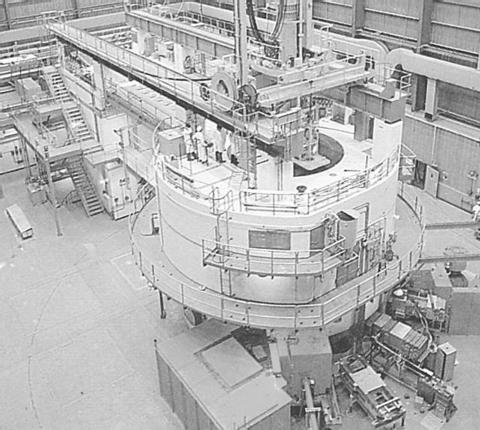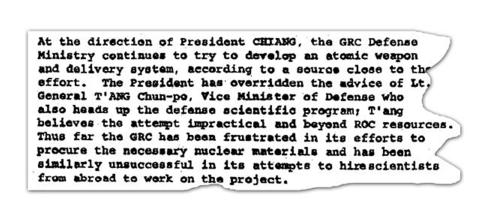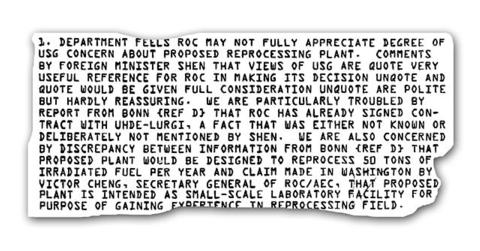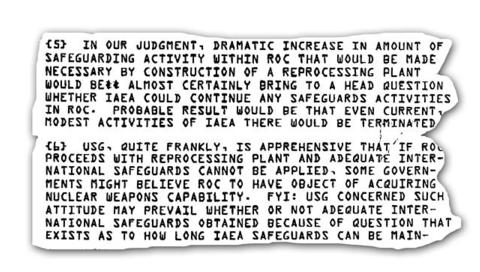Declassification and release of archive documents from the United States today, shows that Taiwan attempted to build nuclear weapons, despite government denials and US government opposition.
These formerly confidential files detail how the US State Department used its diplomatic influence and intelligence sources to promote non-proliferation and halt Taiwan's secretive nuclear weapons program.
But what the US government failed to do, the evidence suggests, was stop Taiwan from giving up entirely its ambition and ability to develop weapons of mass destruction.

SOURCE: THE ATOMIC ENERGY COUNCIL
The story begins in 1964, after China conducted its first nuclear test. Shortly afterward, Taiwan launched its own nuclear weapons program, dubbed the "Hsinchu Project."
There is contention over who was the principal figure behind the programme. Wu Ta-you (
This view was contradicted by National Taiwan University professor of history, Hsu Cho-yun, in a 1966 interview at the US Embassy in Taipei, who said Chiang Kai-shek was the motivating force.

"At the direction of President Chiang, the Chungshan Institute of Science and Technology, which superintends science research and development for the Ministry of National Defense, is continuing to push ahead with its program of developing an atomic weapon."
The quest for friends
Hsu said that Taiwan had difficulty finding nuclear materials for its research and its plans were often blocked.

Initially Taiwan asked the US and Israel for assistance, but the US flatly refused and Israel had its own security problems. Japan was approached but "reacted negatively, as it does to any effort to involve it in the development of nuclear weapons," an embassy document reported.
When Taiwan tried to buy a 50 megawatt heavy water nuclear power plant from the Federal Republic of Germany-based power company Siemens in 1967, the US issued a caution.
Nevertheless, that same year, the US' General Electric Corporation began construction of Taiwan's first nuclear power plant in the northeast part of the island.

Victor Cheng (
The US government later consented to support the sale of the German reactor, so that it would not appear to be contradicting itself and the reputation of the International Atomic Energy Agency to uphold safety standards.
"In view of unequivocal US statements of confidence in IAEA safeguard systems and US assurance to FRG [Federal Republic of Germany] that IAEA safeguards would not hinder German sales of nuclear equipment for peaceful purposes, the Department does not consider we should attempt to forestall sale through approach to either Siemens or FRG."

However, the telegram to the US embassy in Bonn added: "The Department (of state) intends to furnish FRG through other channels USG [US government] information on GRC purchase of Siemens reactor ... we are not yet convinced that purpose motivating GRC desire to buy Siemens reactor is unrelated to interest in nuclear weapons."
Intelligence information confirming this suspicion did get to the State Department, in December 1972, but by this time Taiwan's position in the international arena was already beginning to fade due to the emergence of China.
In 1971 Taiwan was pushed out of the United Nations and its continued participation in international organizations like IEAE was threatened.
After Taiwan lost its membership in the IEAE, a bilateral agreement with the United States -- which had backed efforts to build all three of the island's nuclear power plants -- continued to ensure that safety standards were being met.
"We recently learned that the ROC is considering the purchase of the essential parts for nuclear materials and reprocessing plant from commercial sources in the FRG. Such a plant reprocesses spent reactor cores and also produces significant quantities of plutonium, an essential component of nuclear weapons," a Dec. 14, 1972 memorandum said.
Cheng was advised of the US concern and "described the proposed reprocessing plant as a small scale laboratory exercise designed to develop experience in the reprocessing field," the memorandum added.
Small-scale research
Cheng further downplayed the matter, saying the facilities would cost US$250,000 and would be used to reprocess small amounts of spent reactor cores on an "experimental basis."
The US immediately pointed out to Taiwan that, according to the IEAE, strict standards had to be enforced for such a transfer to take place and that, in principle, the IEAE opposed the transfer of reprocessing plants to a "non-nuclear weapons state."
The US then began plying pressure on Germany and other countries that would be involved in the process. The IEAE board of governors in China also said they would not approve of the transfer.
In January 1973, US Embassy officials in Taiwan spoke to the foreign minister and urged him not to go ahead with the purchase.
The foreign minister, Shen Chang-huan (
Shen denied the idea of building a reprocessing plant had been approved by Taiwan's government, and did not tell the US that Taiwan had already signed a contract with a German firm to purchase the reprocessing plant.
The US confronted Shen over the matter, after which he told the US embassy that Taiwan would not be involved in the construction of a reprocessing plant, a February, 1973, memorandum confirms.
The US continued to monitor Taiwan's attempts to go ahead and construct a reprocessing facility on its own, but documents do not detail how Taiwan achieved this feat.
According to research by David Albright and Corey Gay, published in a "Bulletin of Atomic Scientists" article, entitled "Taiwan Nuclear Nightmare Averted," Taiwan continued on its own.
Their findings show that Taiwan began work in 1969 on uranium fuel, a reprocessing facility, and a plutonium chemistry laboratory.
These facilities were built with the help of equipment from France, Germany, the US and other countries, the article said.
From 1972 to 1974 Taiwan purchased about 100 metric tons of South African uranium, it said. It was also discovered that in 1970 a "Hot Laboratory" was being built and was expected to be completed in 1976.
Cheng, the AEC's secretary-general claimed the lab could only produce about 15 grams of plutonium a year, far short of that needed for a nuclear weapon, the article said.
The CIA concluded in 1974 that "Taipei conducts its small nuclear program with a weapon option clearly in mind, and it will be in a position to fabricate a nuclear device after five years or so," Albright and Gay wrote.
Under increasing international pressure on Sept. 14, 1976, Chiang Ching-kuo, then premier, said Taiwan would not engage in any reprocessing activities. That was not, however, the case.
It wasn't until over 10 years later, however, after the defection of a locally-recruited Central Intelligence agent, that Taiwan's program was brought to a halt.
Colonel Chang Hsien-yi (
Taiwan's official position since then has been that it will not use its scientific abilities to build nuclear weapons. But experts note that if Taiwan wanted to it could develop these weapons quickly, possibly within a year.

DAREDEVIL: Honnold said it had always been a dream of his to climb Taipei 101, while a Netflix producer said the skyscraper was ‘a real icon of this country’ US climber Alex Honnold yesterday took on Taiwan’s tallest building, becoming the first person to scale Taipei 101 without a rope, harness or safety net. Hundreds of spectators gathered at the base of the 101-story skyscraper to watch Honnold, 40, embark on his daredevil feat, which was also broadcast live on Netflix. Dressed in a red T-shirt and yellow custom-made climbing shoes, Honnold swiftly moved up the southeast face of the glass and steel building. At one point, he stepped onto a platform midway up to wave down at fans and onlookers who were taking photos. People watching from inside

A Vietnamese migrant worker yesterday won NT$12 million (US$379,627) on a Lunar New Year scratch card in Kaohsiung as part of Taiwan Lottery Co’s (台灣彩券) “NT$12 Million Grand Fortune” (1200萬大吉利) game. The man was the first top-prize winner of the new game launched on Jan. 6 to mark the Lunar New Year. Three Vietnamese migrant workers visited a Taiwan Lottery shop on Xinyue Street in Kaohsiung’s Gangshan District (崗山), a store representative said. The player bought multiple tickets and, after winning nothing, held the final lottery ticket in one hand and rubbed the store’s statue of the Maitreya Buddha’s belly with the other,

‘COMMITTED TO DETERRENCE’: Washington would stand by its allies, but it can only help as much as countries help themselves, Raymond Greene said The US is committed to deterrence in the first island chain, but it should not bear the burden alone, as “freedom is not free,” American Institute in Taiwan Director Raymond Greene said in a speech at the Institute for National Defense and Security Research’s “Strengthening Resilience: Defense as the Engine of Development” seminar in Taipei yesterday. In the speech, titled “Investing Together and a Secure and Prosperous Future,” Greene highlighted the contributions of US President Donald Trump’s administration to Taiwan’s defense efforts, including the establishment of supply chains for drones and autonomous systems, offers of security assistance and the expansion of

STREAMLINED: The dedicated funding would allow the US to transfer equipment to Taiwan when needed and order upgraded replacements for stockpiles, a source said The US House of Representatives on Thursday passed a defense appropriations bill totaling US$838.7 billion, of which US$1 billion is to be allocated to reinforcing security cooperation with Taiwan and US$150 million to replace defense articles provided to the nation. These are part of the Consolidated Appropriation Act, which the US House yesterday passed with 341 votes in favor and 88 against. The act must be passed by the US Senate before Friday next week to avoid another government shutdown. The US House Committee on Appropriations on Monday unveiled the act, saying that it allocates US$1 billion for the Taiwan Security Cooperation Initiative